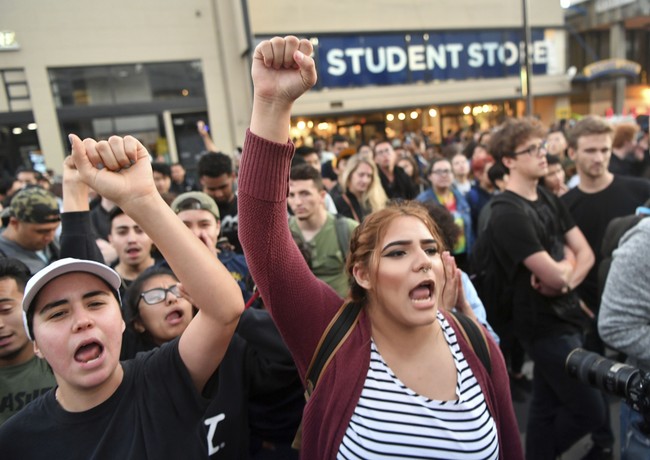Thomas Edsall has an interesting column in the NY Times today. The jumping off point is the idea that Democrats lost this election at least partly because the party has moved too far left on social issues for most voters. To make this point, he quotes an analysis in the Financial Times.
Data suggests the Democrats lost ground with moderates, while holding steady among progressives. Charges that racism propelled voters to Donald Trump are at odds with the rightward swing among Black and Hispanic voters, and with a raft of data showing that racial prejudice is in steady decline among Americans of all political stripes.
Instead, the data shows Democrats taking a sharp turn leftward on social issues over the past decade. This has distanced them from the median voter, just as Wright’s cartoon depicted. We see this not only in Democratic voters’ self-reported ideology, but in their views on issues including immigration and whether or not minorities need extra help to succeed in society. Notably, the shift began in 2016. This suggests that Trump’s election radicalised the left, not the right.
What the author is saying in so many words is that this cartoon posted by Elon Musk in 2022 is basically accurate.
— Elon Musk (@elonmusk) April 28, 2022
The question is what the Democratic party will do about it. Now that it’s clear this is costing them, will they moderate themselves in order to win future elections or is the woke contingent already too strong to allow that to happen. Edsall writes that, as of this moment, it doesn’t look good for the forces of moderation.
There are signs that the Democratic Party not only has adopted left orthodoxy on social and cultural issues but also is still not prepared to tolerate debate over these choices. This is reflected in the hostility expressed toward Democratic leaders who suggest moderating the party stance on transgender rights — a seemingly peripheral issue, as far as the country as a whole goes, that Trump and other Republicans used to portray Democrats as more concerned with special interests than the public interest.
Dartmouth political scientist Sean Westwood agreed with that assessment.
Parties win elections by aligning with the priorities and values of voters. The Democratic Party, however, often seems to assume that its perspective on social issues is inherently superior and that debate itself is morally and ethically unacceptable.
This goes all the way back to something that James Lindsay wrote four years ago: The woke aren’t interested in a debate because debate itself is part of the liberal project that they reject as flawed having led to the current system which they seek to replace.
There are a number of points within Critical Social Justice Theory that would see having a debate or conversation with people of opposing views as unacceptable, and they all combine to create a mindset where that wouldn’t be something that adherents to the Theory are likely or even willing to do in general. This reticence, if not unwillingness, to converse with anyone who disagrees actually has a few pretty deep reasons behind it, and they’re interrelated but not quite the same. They combine, however, to produce the first thing everyone needs to understand about this ideology: it is a complete worldview with its own ethics, epistemology, and morality, and theirs is not the same worldview the rest of us use. Theirs is, very much in particular, not liberal. In fact, theirs advances itself rather parasitically or virally by depending upon us to play the liberal game while taking advantage of its openings. That’s not the same thing as being willing to play the liberal game themselves, however, including to have thoughtful dialogue with people who oppose them and their view of the world. Conversation and debate are part of our game, and they are not part of their game.
The shorthand version of this view is that the “master’s tools” can’t dismantle the “master’s house.” The woke replace debate and persuasion with outright demands for compliance, hence shouting down speakers on campus rather than talking to them. And unfortunately, this isn’t limited to student activists anymore. We saw an example of this recently on CNN.
“I am NOT going to listen to transphobia at this table!”
CNN panelist loses their mind over “slur” used by Republican strategist during trans sports debate. pic.twitter.com/5PXnSJW4A0
— Brigitte Gabriel (@ACTBrigitte) November 9, 2024
One panelist shouts down another, demanding ideological compliance and CNN’s host backs him up. That’s where Democrats are at this moment. But as suggested above, it’s a losing formula with the electorate. The woke may be able to enforce their views on CNN but they can’t do with a majority of voters. So they have a choice to make. Either they moderate to win or they continue to lose. Put another way, how bad do Democrats want to win?
Harvard law professor Nicholas Stephanopoulos thinks the desire to win will ultimately triumph.
I think the party’s desire to win the presidency will be strong enough — especially after four more years of Trump — to allow the Democratic nominee in 2028 to move to the center on controversial issues…
But Tufts pollical science professor Eitan Hersh isn’t so sure.
I do think the Democrats could lose again and again because of this predicament that they are in, in that their core voters (and volunteers and donors) want candidates to pass some litmus tests that the median voter does not like.
And yet another political scientist, David Hopkins at Boston College suggests that moderation is something the party may not be able to choose, even if doing so would bring great rewards.
Parties are not entirely the masters of their own fate. The rising centrality of conflicts over social identity, D.E.I. initiatives, transgender rights, language policing, tolerance of illegal immigration, “fighting the patriarchy,” and other similar topics over the past decade or so was not principally driven by the preferences or choices of Democratic politicians and professional strategists.
In short, you can’t reason with the woke because, as mentioned above, they see reason, debate and persuasion as tools of the enemy, i.e. a way for the liberal consensus they reject to stay in control. So of course they are not going to be willing to moderate themselves for the goal of putting moderate Democrats in power. That would be a rejection of their entire reason for being. They are going to keep demanding compliance with their views no matter what it costs the party as a whole. Better failure than compromise.
The Democratic Party is doomed on social issues because there’s no way to moderate the wokeness the far left has unleashed. If winning depends on moderation, they are never going to win again. To return to the premise of my headline, the far left will never get tired of losing, not if winning means they have to dial it back a notch.
But it was economic issues that were the top priority of most voters this year. The Democrats only hope for the future is that the economic issues favor them strongly enough that voters are willing to overlook the far left ideology. If, say, we have two more years of inflation or a major recession during Trump’s term, then voters wanting change might vote for almost anyone in 2028.
Read the full article here




![WWE Co-Founder Linda McMahon Gets Nominated For Secretary Of Education [WATCH] WWE Co-Founder Linda McMahon Gets Nominated For Secretary Of Education [WATCH]](https://www.lifezette.com/wp-content/uploads/2024/11/2024.11.20-02.22-lifezette-673df0a441d8a.jpg)




